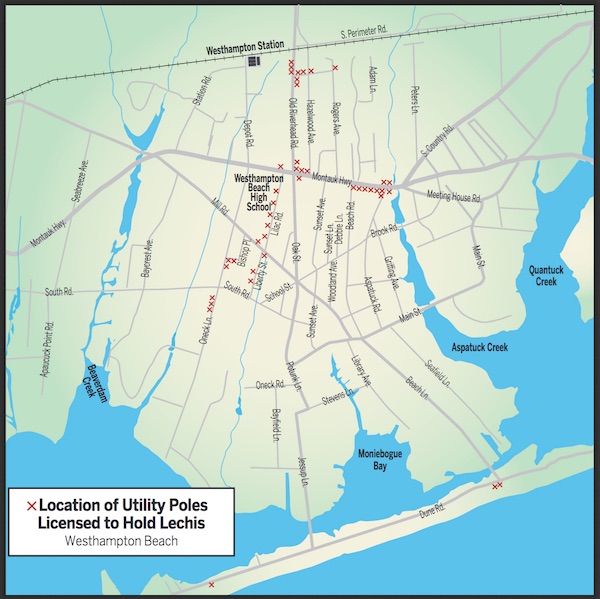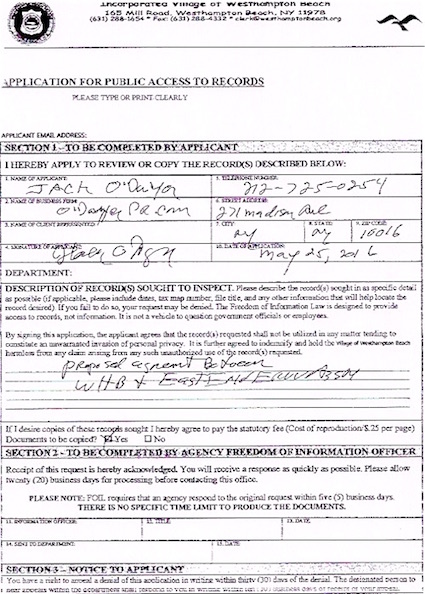Westhampton Beach officials were in communications lockdown today, refusing to provide terms of an agreement that would put permanent Jewish “eruv” markers on 46 utility poles.
A vote on the proposed agreement with the East End Eruv Assn. is scheduled for Thursday, June 2, at 7 p.m.
Mayor Maria Moore has indicated the five Trustees who govern the village would sign the agreement.
Citizens can only guess that it is similar to an agreement signed last year by Southampton since Moore will not provide a copy either to this website or on the WHB website.
The last entry under “Eruv Litigation” on the WHB website is for June 30, 2015.
This website, which cannot get replies from either Moore or WHB outside legal counsel Brian Sokoloff, yesterday filed a Freedom of Information application for public access to records. The FOIL was faxed yesterday afternoon to the WHB Mayor’s office.
Can Take 20 Days to Process
The form says, “Please allow 20 business days for processing before contacting this office. It also notes that FOIL requires that an agency respond within five business days that it has received the request but adds, “There is no specific time limit to produce the documents.”
 FOIL does not seem to hold out much promise that this website or the citizens will get to see the proposed agreement with EEEA before the meeting next Thursday.
FOIL does not seem to hold out much promise that this website or the citizens will get to see the proposed agreement with EEEA before the meeting next Thursday.
Extensive efforts to find any of the “lechis” that are needed to mark the eruv in WHB have been unsuccessful.
Southampton Press reporter Kyle Campbell wrote a front-page article for the March 19, 2015 Press that had the headline, “Eruv Markers Remain Elusive.”
He had obtained, via a FOIL, a map showing the location of the markers on 46 poles but staffers for the paper were unable to find any of them.
Public Space Becomes "Private"
An eruv, for believers, converts public space into the “private domain” or “home” of the observant which frees them from many restrictions related to carrying and pushing objects. Keys may not be carried unless they are attached to something worn on the body, such as a bracelet.
Even in an eruv, an umbrella could not be opened during rain because that would be “building a tent.” No work is allowed on the Sabbath and that includes turning lights on or off.
Robert Sugarman of Weil, Gotshal & Manges, lead attorney for the EEEA, noted the lack of visibility of the markers to Campbell and said the eruv would not cause any type of damage to WHB residents who do not follow Orthodox Judiaism.
Residents who don’t want the eruv say it will be widely publicized and could eventually result in control of the local government and school board passing into the hands of the Orthodox. This has happened in Lawrence and some other Long Island towns, they note.
Jewish law requires that a local government officially approve an eruv before it can be valid. This is why the EEEA is seeking the agreement with WHB officials rather than just declaring, on its own, that an eruv exists.


 Husch Blackwell Strategies has added FleishmanHillard alum Michael Slatin as a principal in its public affairs group.
Husch Blackwell Strategies has added FleishmanHillard alum Michael Slatin as a principal in its public affairs group. Rory Cooper, a veteran Republican operative and policy specialist, has joined Teneo’s Washington office as senior managing director in its strategy & communications practice.
Rory Cooper, a veteran Republican operative and policy specialist, has joined Teneo’s Washington office as senior managing director in its strategy & communications practice. Brian Fallon, who served as national press secretary for Hillary Clinton’s 2016 presidential run, is signing on next month as Vice President’s Kamala Harris’ campaign communications director.
Brian Fallon, who served as national press secretary for Hillary Clinton’s 2016 presidential run, is signing on next month as Vice President’s Kamala Harris’ campaign communications director. TikTok is nothing more than a Chinese propaganda tool that poses “a grave threat to America’s national security and, in particular, impressionable children and young adults,” say two Congressmen who want the platform registered as a foreign agent.
TikTok is nothing more than a Chinese propaganda tool that poses “a grave threat to America’s national security and, in particular, impressionable children and young adults,” say two Congressmen who want the platform registered as a foreign agent. Public Strategies Washington has added Abbie Sorrendino, a former aide to now Senate Majority Leader Chuck Schumer.
Public Strategies Washington has added Abbie Sorrendino, a former aide to now Senate Majority Leader Chuck Schumer.


 Have a comment? Send it to
Have a comment? Send it to 
No comments have been submitted for this story yet.